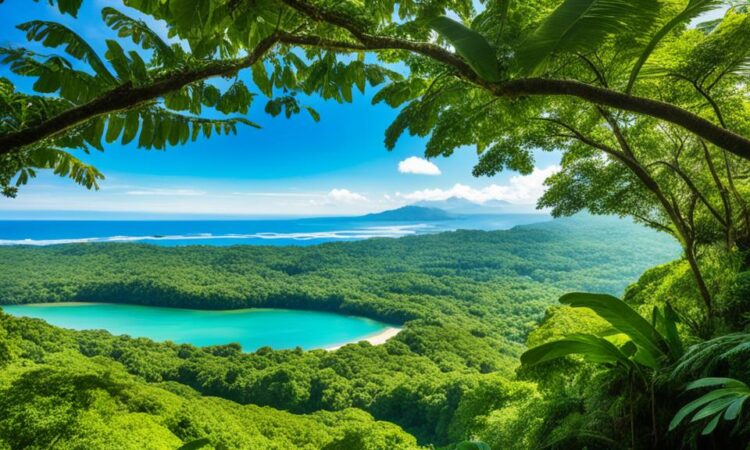
Can Expats and Foreigners Own Land in Costa Rica? Facts Revealed.
In the beauty of Costa Rica, many ask: can foreigners own land in Costa Rica? The answer is yes. This country, with a big heart for nature and over a quarter of its land protected, invites foreigners to own a piece of heaven. Here, the law treats foreigners nearly the same as locals. However, there are some rules, especially near the sea, but overall, buying property here is seen as safe and stable.
It’s key to know the legal steps for foreigners to buy land in Costa Rica. Our team helps make buying property clear and worry-free for you. Costa Rica is a special place with great schools, no army since 1948, and a comfortable life possible with $2,000 a month. This makes it perfect not just for retirees but for anyone looking to live a full, happy life.
Key Takeaways
- Foreigners enjoy the same property rights as Costa Rican citizens, subject to a few restrictions.
- Natural beauty and sustainable living are prime attractions with over 26% of Costa Rica dedicated to protected areas.
- Costa Rica’s real estate market offers affordability with average rents significantly lower than in North America and Europe.
- The nation offers a premier educational environment with multiple bilingual schools following American curriculums.
- Legal processes involving property purchase, such as Public Registry recording and Escritura de Traspaso, solidify the integrity of ownership.
- A peaceful way of life has been the norm since 1948, contributing to the country’s stability and desirability for foreign investors.
Introduction to Costa Rica’s Real Estate Landscape for Expats
Investing in Costa Rican real estate offers many benefits for foreigners. The country’s rich nature, favorable taxes, and strong tourism attract overseas investors. Expats can fully own properties, even beachfront ones, without needing a local partner. Yet, understanding the laws is key. Costa Rica’s legal system is welcoming but detailed. Expert advice is essential to navigate it.
Understanding the Appeal of Costa Rica for Overseas Buyers
Costa Rica’s nature and eco-friendly lifestyle attract many expats interested in buying real estate. The government supports owners with a variety of property choices and high living standards through environmental care. The strong rental market, driven by tourists seeking genuine Costa Rican experiences, highlights the country’s appeal.

Legal Framework Governing Land Ownership by Non-Citizens
Foreigners are curious about Costa Rica’s land ownership laws. The laws give international buyers similar rights to locals. Beachfront properties have specific rules under the Maritime Zone Law, including a public zone and a restricted zone. Successful property buying involves careful planning and legal help from professionals familiar with Costa Rican laws.
| Type of Property | Ownership Rights | Legal Considerations |
|---|---|---|
| Private Land Titled Property | Full ownership rights for foreigners | Clear title; full registration; minimal restrictions |
| Beach Land Property | Restricted ownership within Maritime Zone | Zones designated for public use and restricted use; 50m public zone and 150m restricted zone as per Maritime Zone Law |
| Protected Areas | Conservation laws may apply | Specific restrictions under environmental and zoning regulations |
| Rental Properties | Excellent rental market opportunities | Requires compliance with tourism and business regulations |
Using Costa Rica’s legal framework well means making informed property decisions. Working with professional agents and attorneys helps navigate the market. Costa Rica is more than just a paradise. It’s a wise investment choice for expats and foreigners.
The Legalities of Owning Land in Costa Rica as a Foreigner
Legalities of owning land in Costa Rica as a foreigner come with various requirements and rules. Foreigners can buy and own real estate just like Costa Ricans. But, understanding the foreign ownership laws in Costa Rica is crucial. This helps when buying property as a non-citizen
To make sure the property is really yours, a deep look at the title is needed. This is key in Costa Rica’s laws. Checking the escritura (deed) against the official map helps too. PropData, led by retired Brigadier General McMerty and Alvaro Carballo, can help with this.
It’s wise to also get a separate study of the land’s boundaries. This avoids future problems. Using companies like Stewart Title Guaranty Company for title insurance is a good move.
Buying property involves many documents, like tax receipts and a notary. The process can get tangled with local rules, such as needing a permit for building. This can make costs go up.
Becoming a legal resident in Costa Rica opens doors, like pensionado or investor status. Each has its own rules, like showing steady income. It’s best to have a bilingual real estate lawyer and a notary helping you.
Buying property also brings fees, like for transferring the title. This is about 5-6% of the sale price. For seaside properties under the Maritime Zone rule, foreigners can only own up to 49%.
If you’re buying from afar, give a SPECIAL power of attorney to someone here that you trust. Hiring a real estate agent who knows the area helps a lot. They can guide you, more so now, as prices are rising.
For US and Canadian investors, Costa Rica’s property market is attractive. Prices vary by city, offering different opportunities. Below is a chart showing average prices in key areas:
| City | Average Price per m² (City Center) | Average Price per m² (Outside City Center) |
|---|---|---|
| Tamarindo | $2,384.65 | $1,918.63 |
| San José | $1,854.22 | $1,354.67 |
| Santa Ana | $1,982.77 | $1,742.80 |
Knowing about title vs concession land is key for your investment. It helps you understand more about the land and its condition.
In summary, buying property in Costa Rica is tempting. But respect for its laws, knowing your financial duties, and using professional services are key steps. Start with careful planning and end with a property that fits within the law.
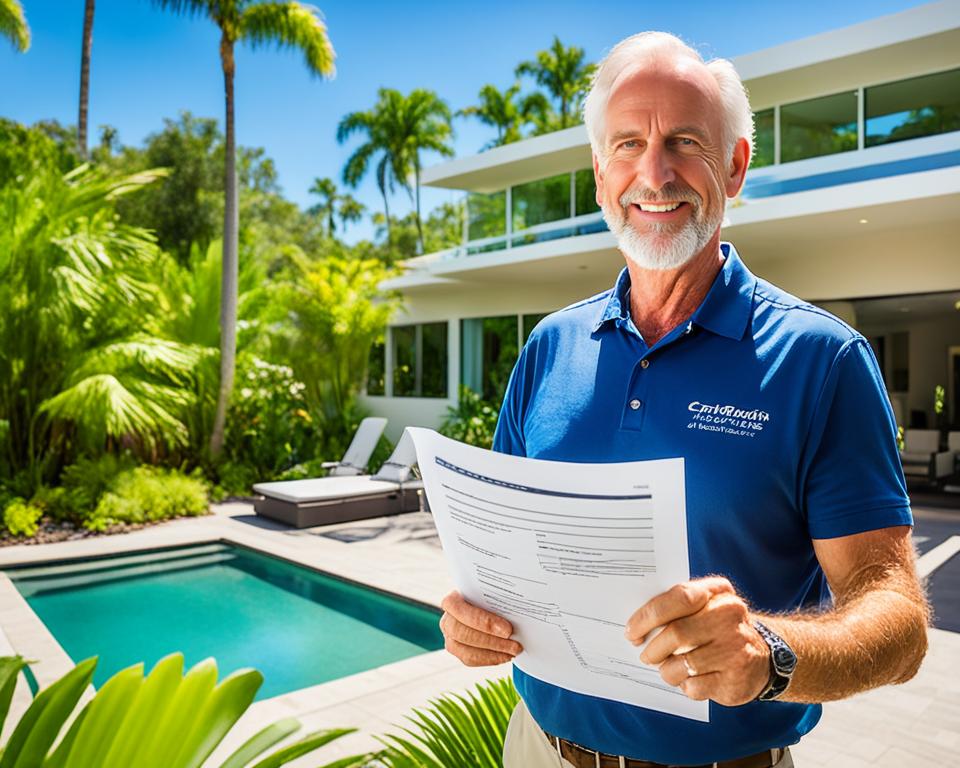
Can Foreigners Own Land in Costa Rica
Finding out about the foreign ownership regulations in Costa Rica is key for anyone from abroad looking to buy land there. The country allows foreigners the same rights to own property as locals, except for voting rights. This makes buying land in Costa Rica easier for non-citizens.
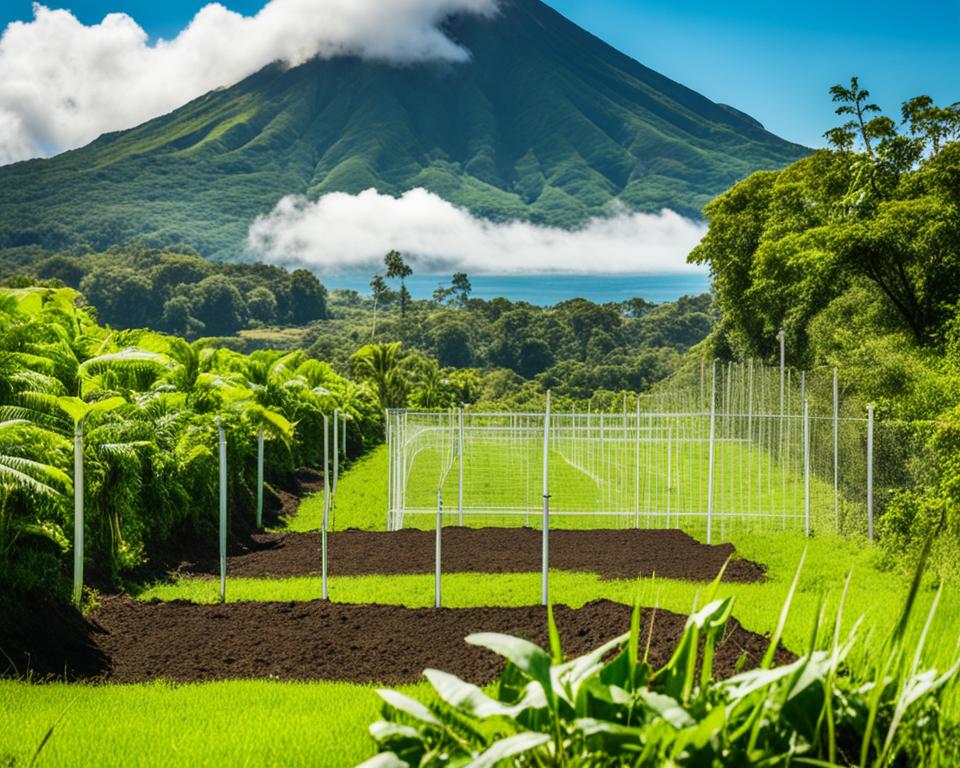
However, certain rules limit foreign ownership. Properties near the beach and those given to farmers by INDER can’t be fully owned by foreigners. Also, a foreigner can only own up to 49% of land in any municipality to keep the nation secure.
When it comes to buying property, locals and foreigners face similar costs. Usually, real estate agents charge about 5% in the Central Valley and up to 7% in other areas. The cost for transferring the title is around 5-6% of the sale price. This fee is split between the buyer and seller and covers various legal costs.
There are yearly taxes on property too, generally at 0.25% of its value. Owners of luxury homes pay an extra tax on a sliding scale. A tax on property owned through corporations was removed in 2015, with new laws pending. Condos and gated communities also have their own fees.
Don’t forget closing costs, which are about 3.6% of the purchase price. Plus, if your home is worth over $214,000, you’ll pay a Luxury Tax of up to 0.55%.
The market incorporates both legal and financial aspects in its pricing. For example, homes in San José averaged $1,110 per square meter in July 2019. Prices in Costa Rica vary widely, from affordable homes at $25,000 to multi-million dollar estates.
Foreigners usually look for more expensive homes than the average local, drawn by Costa Rica’s beauty and safety. The country’s low fraud risk also makes it a prime spot for international buyers wanting a slice of paradise.
How to Navigate the Property Purchasing Process in Costa Rica
Getting a property in Costa Rica as a foreigner means knowing the land ownership regulations in Costa Rica for foreigners. You’ll need a smart plan and expert advice. We’re here to help from picking the property to closing the deal.
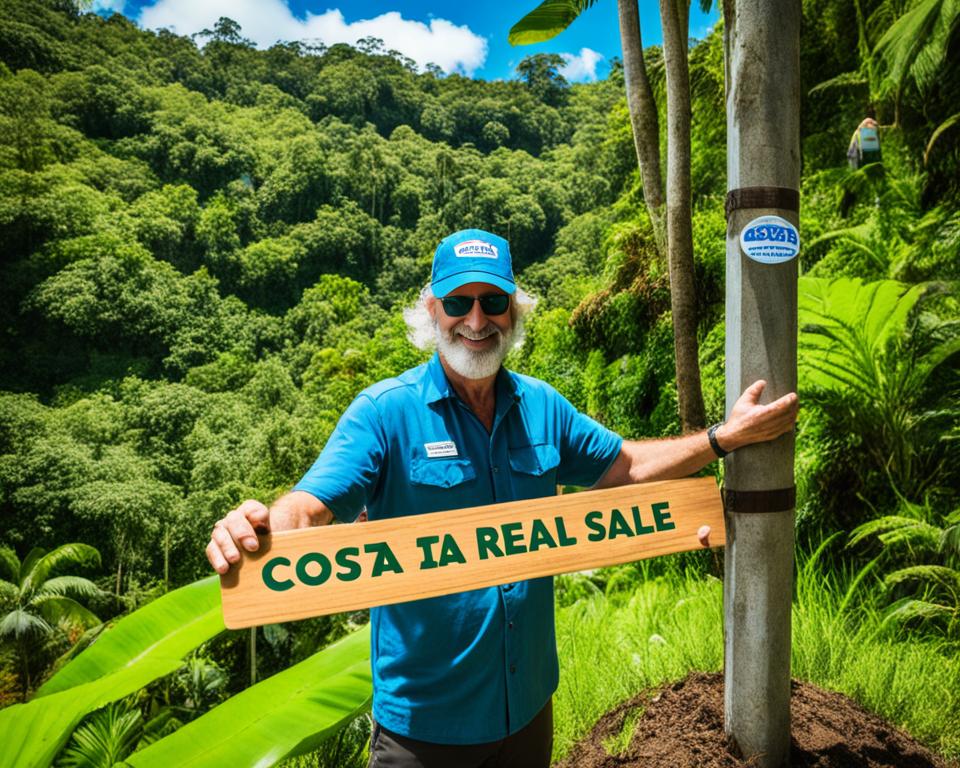
Identifying the Right Property: Tips for Expats
Start by finding a property that meets your needs and budget when buying real estate in Costa Rica as a foreigner. Look at the area, what’s around it, and its future value. We offer insights on top locations and access to our Inner Circle. Here, you’ll find properties selected for expat investors.
Essential Steps and Documentation for Finalizing a Purchase
Choosing the right property leads to the key stage of paperwork and legal steps. As a foreign buyer, you’ll face standard steps like paying a deposit and signing agreements. It’s also crucial to check the property carefully to avoid problems. Working with qualified lawyers is essential. They’ll examine the property’s legal status, do registry checks, and make sure the property is clear of issues, safeguarding your purchase.
| Total Investment Amount (USD) | Loan Amount Range (USD) | Investment Criteria |
|---|---|---|
| Available within 3-6 months | Minimum to Maximum desired | Current capability to invest |
| Lending Experience in Costa Rica | Preferred Lending Locations | Loan Processing Timeframes |
| Diligence Performed | Lawyer Network Engagement | Investment Profile Updates |
Remember, expert advice is crucial when buying real estate in Costa Rica. At Gap Investments, you can talk directly with our Operations Manager. They offer personal advice and the latest updates on land ownership regulations in Costa Rica for foreigners. We make sure your investment journey is smooth and updated with any style changes over time.
Foreign Ownership Versus Domestic: Are There Any Differences?
Many wonder if the rules for foreign investment in Costa Rica real estate change for outsiders. They ask about the property ownership guidelines for foreigners in Costa Rica. Indeed, the rules are quite similar for both locals and foreigners, with few exceptions.
In the Maritime Zone, the first 50 meters from the high-tide line are public and off-limits for ownership. Foreigners can use the next 150 meters, but they can’t be the main owner unless they’ve lived in Costa Rica for five years. This shows how vital it is to work with experts in Costa Rica real estate.
Beyond coastal areas, foreign investors have the same rights as Costa Ricans. From farmland to city homes, buying is simple. It’s important to work with trusted financial advisors to understand local laws.
| Financial Aspect | Gap Investments Details |
|---|---|
| Average Interest Rates | 12% to 16% per year |
| Loan-to-Value Ratios (LTV) | 10% to 50% with corresponding interest rates |
| Loan Amounts Offered | $50,000 USD to $3,000,000 USD and above |
| Home Equity Loan Terms | 6 months to 3 years |
| Total Closing Costs for Loans | Approximately 8% of the loan amount |
| Max Loan Based on Property Value | Up to 50% of appraised registro value |

Buyers should know about certain differences, like pre-payment penalties. Gap Investments warns of a penalty equals to a year’s interest. Hence, expert advice is crucial.
Our team aims to make foreign investment in Costa Rica real estate smooth for you. We can guide you through everything from LTV ratios to property law. We’re here to help you invest confidently.
Investing in Costa Rican Real Estate: What Expats Need to Know
Investing in Costa Rican real estate has its perks and challenges. The beautiful scenery and the chance for investment growth draw in many foreigners. However, it’s key to understand local laws and move carefully through the real estate market.
Exploring the Investment Benefits of Costa Rica’s Real Estate Market
Costa Rica is an attractive place for expat investors, thanks to low property taxes and booming tourism. Knowing about property ownership rights for foreigners in Costa Rica is crucial. Additionally, competitive loan options from private money lenders make it easier to jump into the market.
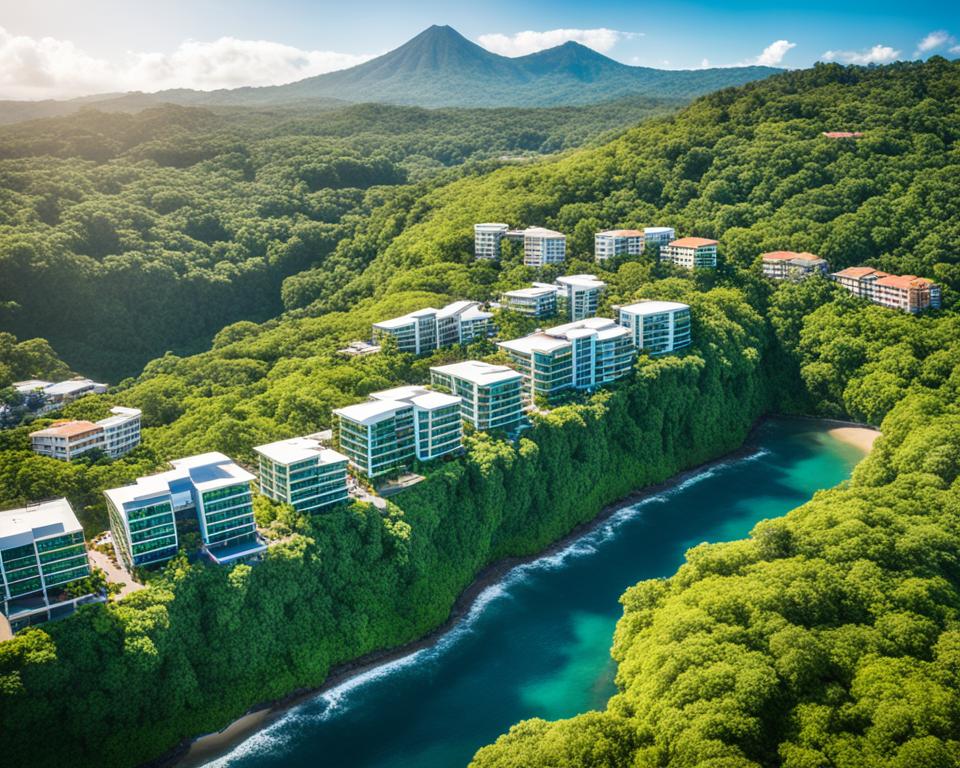
Equity loans are a main way to finance purchases, with terms that can vary widely. Many retirees prefer these loans because they are straightforward and short-term.
Risks Involved in Real Estate Investments in Costa Rica
The positive investment climate in Costa Rica comes with caution. Being informed about Costa Rica real estate laws for non-citizens is key. This helps avoid legal issues and understand the risk of expropriation, where the government pays before taking land for public use.
Getting funds for investments is now easier. Funding investments through a self-directed IRA is an option that opens new doors. Knowing about Home Equity and Home Collateral is essential for using your property’s value for loans.
| Investment Aspect | Details |
|---|---|
| Loan Terms | 6 months to 3 years for equity loans |
| Interest Rates | 12% – 18% per year for private money loans |
| Closing Costs | Approximately 8% of the loan amount for private/hard money loans |
| Minimum Loan Size | $50,000 USD via Gap Investments |
| Investor Profile | Mostly retirees in Gap Investments |
| Loan Origination | Faster with less documentation required compared to bank loans |
Private money loans have a quicker setup, often needing less paperwork than bank loans. This makes investing easier for non-citizens wanting property in Costa Rica. Remember, all loan-related costs fall on the borrower, not the lender. Keep this in mind when planning your investment.
Case Studies: Success Stories of Expats Owning Property in Costa Rica
Many have made their tropical dream come true in Costa Rica. These success stories of expats in Costa Rica show how to become part of this beautiful place. Owning property there often means more than moving. It’s about starting a new, exciting life full of peace and adventure.
The tales of foreign investment success in Costa Rica property are inspiring. They highlight the journey from dealing with legal matters to finding the perfect home. These stories prove the rewarding adventures that await in Costa Rica.
Becoming successful in foreign investment in Costa Rica property involves more than the final goal. It often means working with pros like Lawsen Tellier from Grupo Gap. He guides investors through an 18-step process, ensuring their investments are safe and high-quality.
Finding a home in this tropical paradise is more than a dream. It’s a journey of possibilities, led by experts. – Glenn Tellier, Founder of Grupo Gap
Overcoming challenges like new laws and financial details is possible in Costa Rica. Here, private loans help cover costs, with terms up to 3 years. Interest rates are usually between 12-16% a year, depending on the loan’s value.

Though closing costs are about 8% of the loan through Gap Investments, they’re worth it. They ensure the property transfer is smooth and clear. Plus, a recommended pre-payment penalty secures a year’s interest for lenders, protecting their investment.
Every property ownership experience in Costa Rica often has experts like Glenn Tellier behind it. With 25 years of experience, he helps make every investment a potential success story.
We share these stories to celebrate achievements and guide future buyers. Owning property in Costa Rica offers a chance for wealth, collaboration, and peace of mind. It’s a guide to success for anyone dreaming of living in this paradise.
Conclusion
When we look at Costa Rica’s housing market, it’s clear that buying property there has many perks for US citizens. The beautiful beaches, green landscapes, and peaceful living attract more people. Especially during the pandemic, more people wanted bigger, remote homes. This has increased investments in property, mainly from the US and Canada. The reasons to buy in Costa Rica go beyond just wanting more space. They include good infrastructure, great weather, and stunning natural views. These make owning property there like having your own paradise.
Americans will find buying property in Costa Rica easy, except for Maritime Zones which have strict rules. The market has something for everyone. This includes luxury homes in Playa Flamingo to more affordable options in Playa Tamarindo. It’s important to know about extra costs like transfer taxes and notary fees when buying. These costs are usually split between the buyer and seller, making things fair.
Looking at Costa Rica’s real estate, we see a clear message. The country, with its strong government and vibrant culture, welcomes property buyers. But, smart investors should proceed with care. It’s important to understand the legal side and work with experts. With the right planning and advice, foreigners can make a profit and enjoy the good life in Costa Rica. Forbes and the National Association of REALTORS® rate Costa Rica highly. It’s seen as an ideal place for retirees and investors, offering both peace and chances for success.
FAQ
Can foreigners own land in Costa Rica?
What property rights do foreigners have in Costa Rica?
Are there foreign ownership regulations in Costa Rica?
What are the legal requirements for foreigners owning land in Costa Rica?
What should expats consider when investing in Costa Rica real estate?
How can expats navigate the property purchasing process in Costa Rica?
Are there any differences in real estate ownership for expats compared to local citizens in Costa Rica?
What investment benefits does Costa Rica offer to expats?
What are the risks involved in real estate investments for foreigners in Costa Rica?
Do expats have success stories about owning property in Costa Rica?
Source Links
- https://costarica.org/living/
- https://news.co.cr/process-buying-buying-real-estate-in-costa-rica-explained/
- https://offshore-freedom.com/blog-articles/best-caribbean-islands-to-buy-real-estate/
- https://immigrationexpertscr.com/category/immigration/
- https://www.gaprealestate.com/costa-rica-real-estate-laws-2/
- https://www.costaricaguide.co.cr/real-estate/buying-process/property-rights-foreign-investment.html
- https://ticotimes.net/2016/01/14/the-19-step-costa-rica-real-estate-guide-for-foreign-buyers
- https://wise.com/us/blog/buy-property-in-costa-rica
- https://www.hrgvacations.com/blog/costa-rica-real-estate/guide-buying-property-costa-rica-what-you-need-know
- https://www.specialplacesofcostarica.com/blog/buying-property-in-costa-rica-frequently-asked-questions/
- https://gapinvestments.com/en/inner-circle/
- https://www.costarican-american-connection.com/how-buy-costa-rica-property
- https://gapinvestments.com/en/costa-rica-investments/
- https://thelatinvestor.com/blogs/news/costa-rica-real-estate-foreigner
- https://www.costarican-american-connection.com/can-a-us-citizen-buy-property-in-costa-rica
- https://gapinvestments.com/en/faq/
- https://www.tresamigos-cr.com/buying-property-costa-rica
- https://crie.cr/buying-property-in-costa-rica-as-a-foreigner/
- https://gapinvestments.com/en/about-us/
- https://www.nosararealestatereport.com/tag/rica/page/2/
- https://www.starterstory.com/costarica-business-ideas
- https://www.slideshare.net/cesacha3/southern-costa-rica-news-1
- https://costaricachristies.com/blog/4-things-to-consider-when-buying-a-house-in-costa-rica
Article by Glenn Tellier (Founder of CRIE and Grupo Gap)
